
This is hard for me to write. I risk incriminating people with whom I am making peace. I now recognize that they, as well as I, were operating out of ignorance. Yet I must tell my story on behalf of those with similar stories. Many of them are unable to speak for themselves, either because they live in fear, or because they have already lost their lives.
I realized I “had homosexual temptations” during my senior year of high school. I had no one to turn to with it. I felt uncomfortable discussing it with church leaders, and the other youth group members spoke gleefully of “flamers” going to hell. My last week of church camp before heading off to Bible college, I opened up to one of counselors. He recommended I let the authorities at my college know about my “issue” so they could help me through it, so I could grow closer to God and be a witness to others, so that they might not go to hell.
I did so almost immediately after arrival. They said I’d best not let other students know about my temptation, as I might upset them, and they strongly recommended counseling to help me overcome my attractions. However, I convinced myself I could conquer my temptations on my own. I’d read that I was probably just going through a phase. God had the power to conquer any sin, and I was a Christian, a child of God. This would ultimately be as simple as staying close to God.
However, it burdened me to hear other students speak of their own issues with sex, alcohol, and so on, whilst I was to remain silent. I decided to confide in a few students I deeply trusted, for advice and spiritual support. I fell in love with one of them. Try as I might to guard that information, it leaked to the authorities. They informed me that if I was to remain in school, I must attend regular counseling to overcome my issue.
The first two counselors claimed their technique could conquer any sin issue in six to eight weeks. This proved to be wildly optimistic. Making simple behavioral changes did not alter what went on in my mind and my heart. It didn’t change my thoughts, desires, and hopes. It didn’t change the dread I awoke with whenever I dreamt of holding hands with a man.
I then met for about two years with a counselor who had previously held a position of authority over me and with whom I still had some connections outside counseling. In secular practice, this is forbidden. The counselor is to approach the client with a clean slate, and influence outside the office taints the delicate nature of the counseling relationship. However, in the church, authority figures routinely counsel those under them.
Those sessions proved difficult for me. Despite my following my counselor’s advice to the letter, I still thought about men. I wanted to hold hands with them, to kiss them. I would fantasize about sharing my home with a man for the rest of my life. Interestingly, thoughts of sex with men were rare. I tried to shut down my sexual drive in order to avoid the inevitable guilt and shame.
All the while, my mental health spiraled out of control. My lifelong depressive state began alternating with rapid, uncontrollable thoughts—paranoia, terror, self-destruction. I felt that my evil homosexual desires were destined to be known regardless of what I did, that my Christian witness would collapse and I would cause people to go to hell.
One night, a random comment from an acquaintance tipped the scales. I realized that I was a Christian, but I was also gay. I had always been told that Christians go to heaven and gays go to hell. I was thus a contradiction, and in my whirlwind mind, contradictions couldn’t exist. I had to do something. I had to end the contradiction.
I almost did it. I almost flattened myself from a leap off an overpass. But at the last minute, I called a suicide prevention line.
I spent ten days in the hospital. They determined what others had suspected, that I had bipolar disorder. I struggled to put my life together after my stay, but ultimately, it was best for me to move back to my hometown to recuperate.
Once home, I thumbed through the Yellow Pages and discovered an ad for a counselor who promised to deliver clients from homosexuality. I leapt at the opportunity. Here was a specialist, someone who would understand exactly what I was going through, someone who had helped others overcome their temptations. Perhaps now I could conquer my shame. Perhaps I could one day walk down the streets without strangers yelling, “Hey, faggot!” at me. Perhaps now I would not cause someone to go to hell.
For two years, I got the same message. “You have homosexual temptations because your father was distant and your mother was smothering.” But my mother was pretty lenient. Also, why didn’t my brothers have this issue? “Well, it wasn’t that your father was distant and your mother was smothering, you just perceived it that way, and your brothers perceived it differently.” We argued a lot. If I was doing what he told me to do—stay devoted to the Bible and pray—and it didn’t have the desired result, he would tell me I just wasn’t doing it right or doing it enough. If I fell away from the practice, he berated me for not staying close to God, that I clearly wasn’t serious about being healed of homosexual temptation. He began demanding that I attend the same church as he, since his was the only local congregation who had ascribed to his practices. In the end, he closed his practice owing to finances.
Looking back over my journals from that time, I see I was already expressing doubts about these treatments. I had had no results in nearly eight years. But the message of the counselors and churches remained—I simply needed to work harder. Until the point that I had no doubts that I was in fact a heterosexual, I would not have a close relationship to God, I could hold no position that even looked like a leadership role in the church, and I would be a “stumbling block” to others—I risked causing others to go to hell.
Two more years I continued with counseling from different leaders at church. They told me nothing I hadn’t already heard. Any doubts I had were quashed by the proclamation that I was not right with God. Yet one reality grew clearer to me: the more I tried to draw close to God in the way these counselors had told me, the further from God I grew. It is said that the definition of insanity is to do the same thing repeatedly expecting different results. By this definition, I was insane.
I approached one of the counselors. I told him it was clear to me that what he was telling me to do was actually pulling me further from God, not drawing me closer. What if I were to remain in the congregation admitting that I was a homosexual—that I was gay—and that that was okay? I didn’t even bring up whether I thought it would be okay to date or have sex or anything—I hadn’t reached those conclusions yet. He told me that I would always be welcome in the congregation, but because they loved me, they would constantly warn me of the error of my ways. I decided I could not live in that kind of unbalanced relationship. That was the last day I attended that church.
It has been quite a journey since then. I moved to Minneapolis, “The San Francisco of the Midwest.” I have affiliated with religious groups who audaciously claim that God loves me—and everyone else—just as I am. I am not beholden to mere human opinion. My relationship with God is much closer than it was in my younger days, though its shape is much different from what I expected a close relationship with God would look like. God is replacing bitterness with grace, resentment with reconciliation, and despair with hope. Perhaps one day I will build a home with another man—or perhaps I will be single the rest of my life. Regardless, I know that the love and acceptance I sought in God’s representatives, I have found in God.






Share